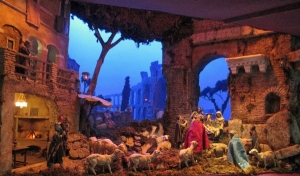In the stable in Bethlehem a new world is beginning
by Antonio Grappone
On December 20th, in reply to an unusual request, an article by the Holy Father was published in the Financial Times, one of the world’s most prestigious financial newspapers. The request followed the publication of the third volume Jesus of Nazareth, concerning the infancy narratives, and commenting on the celebration of Christmas.
For the Financial Time, Benedict XVI took up some of the themes from his book, commenting on them for the newspaper’s typical readership. The article gives a straightforward but deep presentation of the Christian vision of commitment in public life. On the one hand, promotion of the common good, justice and peace, particularly protecting the weakest members of society, cooperating with all those who share these goals. The anthropological principle that motivates the Christian is recognition of the supreme dignity of each human person and of the vocation to eternity.
What the Pope means by ‘ideology’ is set out in his commentary of the Gospel passage on “rendering unto Caesar”. Ideology involves a vision of the world and of the human person in which politics and economics take the place of God. The Roman emperors affirmed this divine prerogative. If we consider the tragic events of the 20th Century, with its world wars, concentration camps and gulags, and with the humiliation of the human person in the name of utopias, the Pope’s words are easy to understand. The Pope, however, is looking at the world of today and the temptation – from which Christians are not exempt – to adopt ideological positions. Not only the ideologies that remain from the past, born in Europe but still afflicting many non-European countries; rather the ideologies that are imposed by the most advanced societies today, and prevail in international organisations, reducing the democratic space while presenting themselves as liberal and liberating.
If we understand the Pope’s definition of ideology, we understand that ideology substitutes itself for God, and substitutes God’s creation with human activity and projects. These new ideologies are recognisable because they seek to control things that are beyond their reach: a State that denies the right to life from its conception until its natural end; or that seeks to change the definition of the family or remove from parents the right to bring up and educate their children. Such States are seeking to take the place of God. Paradoxically, militant secular ideology in its diverse forms tends to promote the State as a theocracy – the State as God – exactly in the same way that the old 20th Century ideologies did.
Benedict XVI concludes with a strong note of hope. Just as in the times of Emperor Augustus’ census and Jesus’ birth, each human ideology that purports to have divine attributes, even as it is newly born is already old and dying. This is the meaning the Pope gives to the many representations of the crib, where Jesus is born among the ruins of an old empire, old even though it seems at the height of its powers. This is not a historical inaccuracy, but a profound view of things. In the stable in Bethlehem a new world is beginning, apparently unseen, but still absolutely definitive, relegating all that is false in this world to a fate of disappearance into the past of human history – despite appearances of unstoppable progress.
Quite a message of truth and hope, and not only for the readers of the Financial Times!


